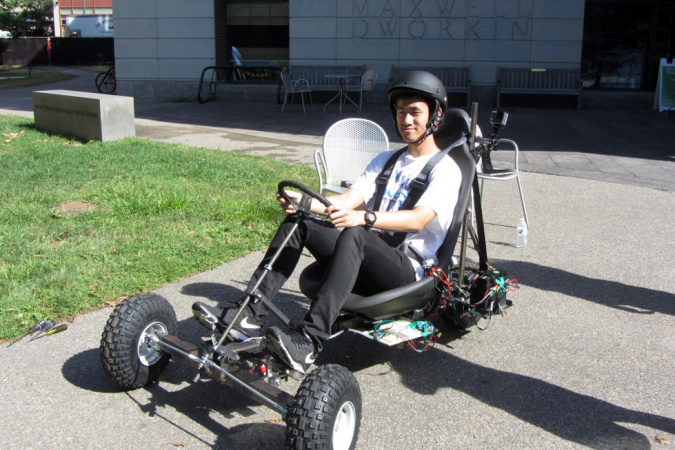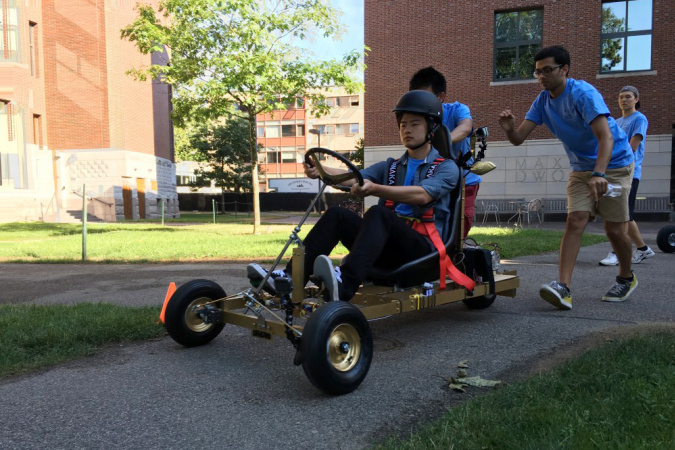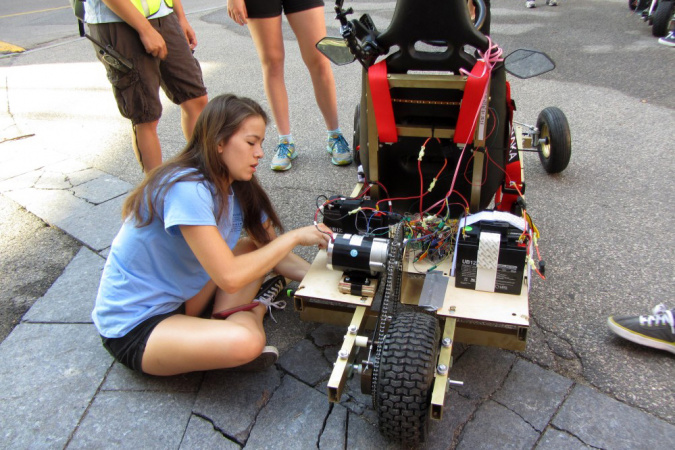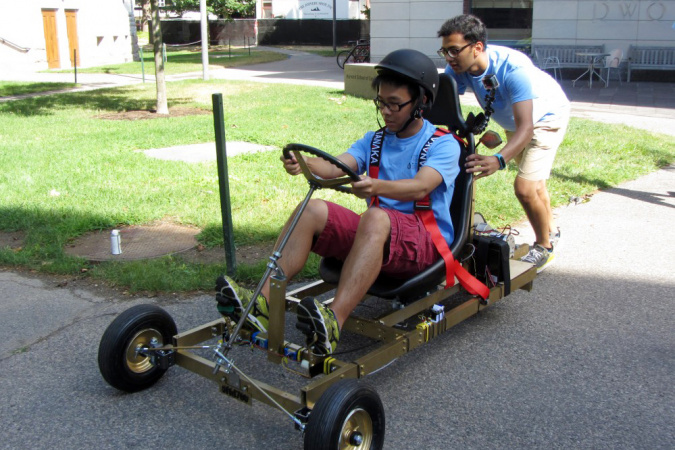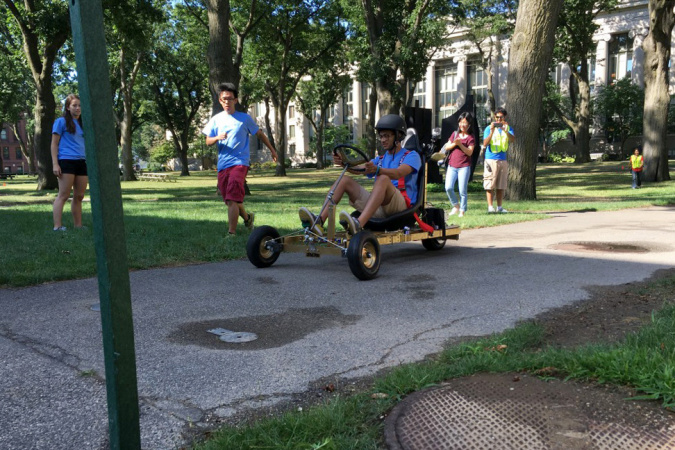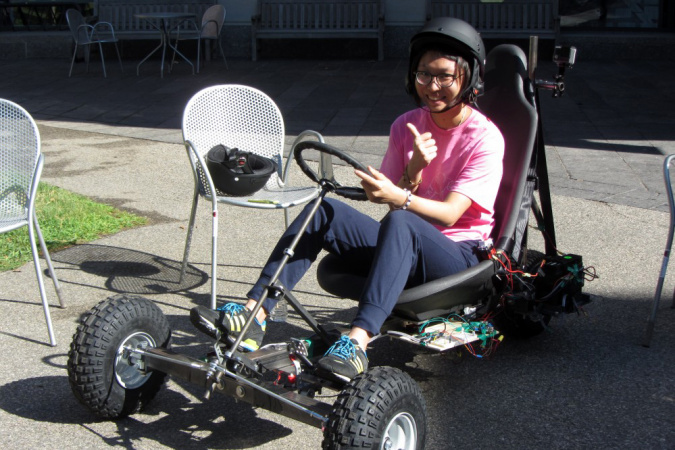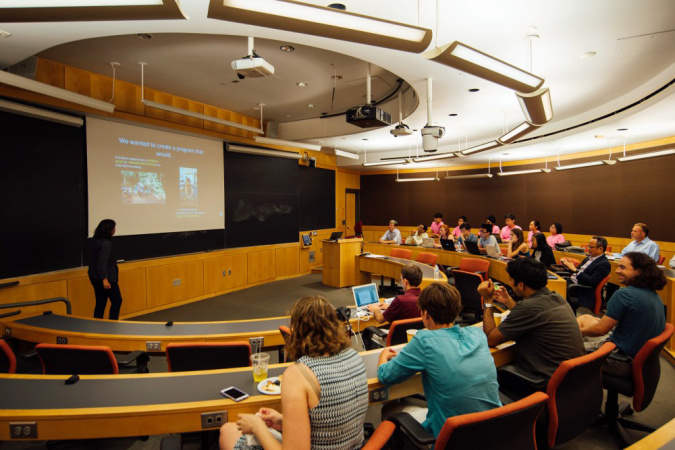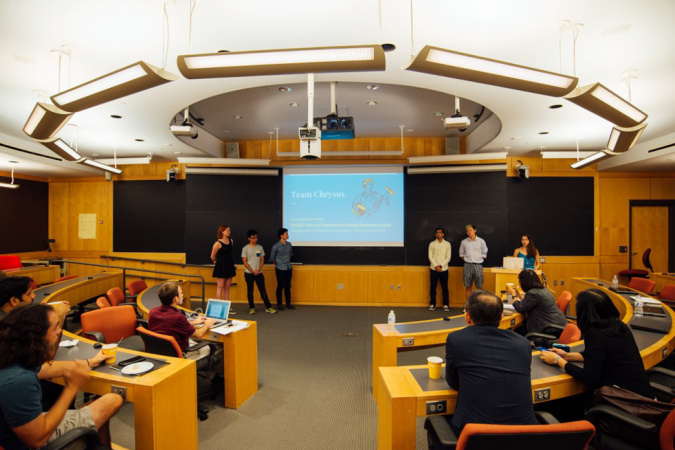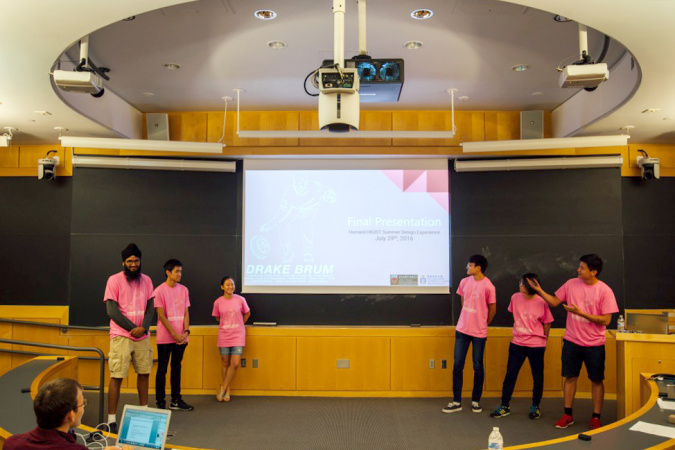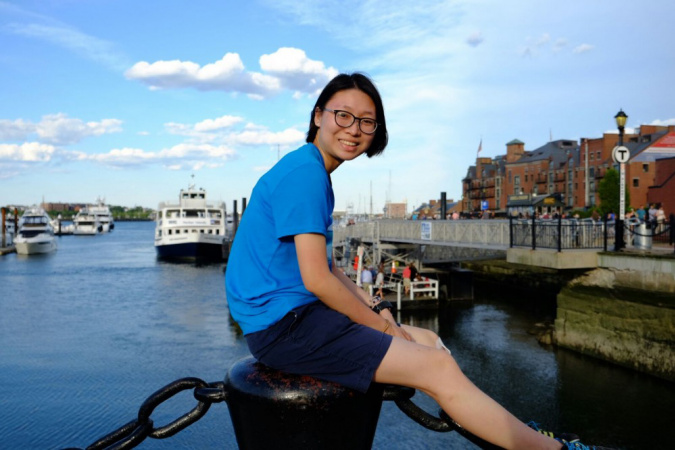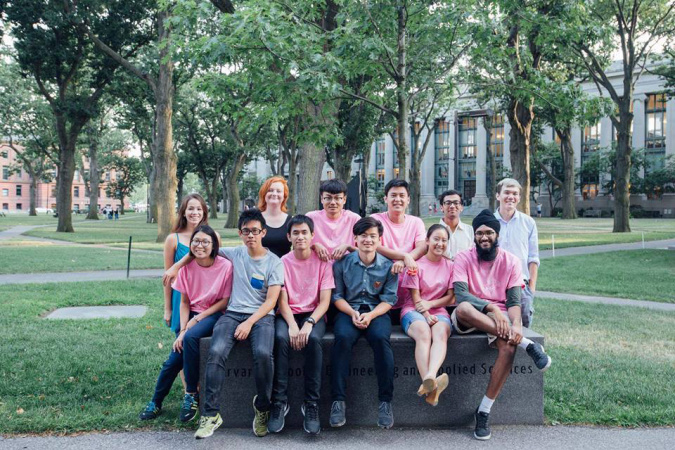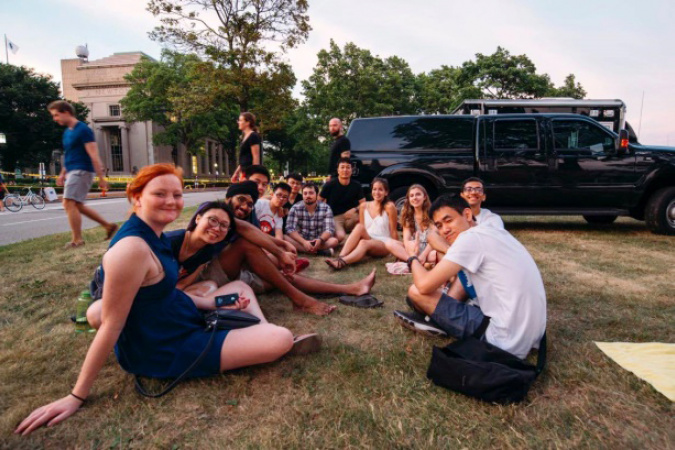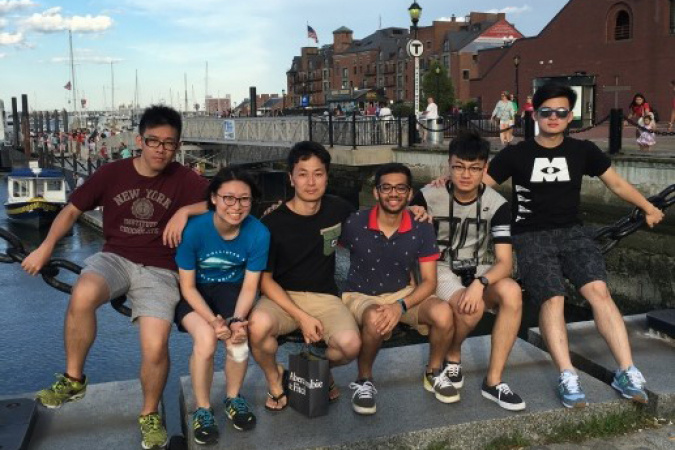Harvard-HKUST 2016 Student Sharing
CHEN Liqi (BEng in Electronic Engineering)
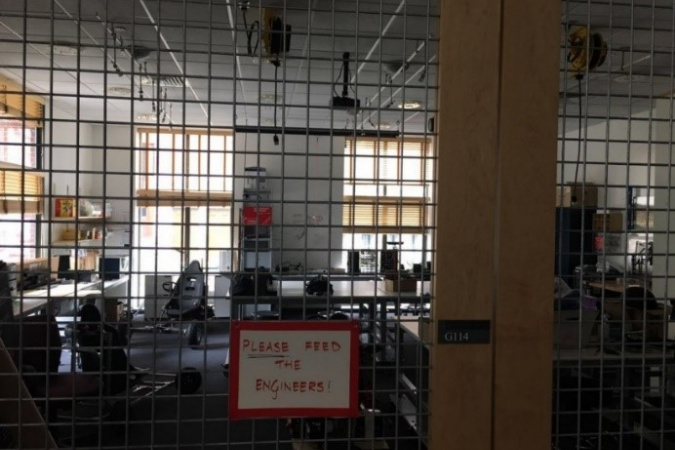
During June 11th to July 31st, 2015, I participated in the Harvard-HKUST Summer Research Program under the topic of Personal Electric Vehicle, in both HKUST, Hong Kong, and Harvard University, US. It’s an amazing overseas research activity, and I feel it is my honor to have the creative experience in this summer and be a member of this energetic community.
This summer program, as is indicated in its name, consists of two parts: the first part was during our 20-day stay in Hong Kong, when we started team building, brainstorming designs and went through some training sessions about basic knowledge and skills required in the project, and for the other part, we went to Harvard University and spent roughly a whole month working on material purchase, product fabrication and optimization. The program started on June 11th, the day the Harvard students arrived in Hong Kong. After settling down on campus, we showed them around campus and led them to LG1 canteen to try out the delicious food there, at least they thought so. On the following days, besides regular training session and working hours, we did sports together, went hiking and explored downtown Hong Kong. The work we finished prior to departure for US included prototype profile design, material selection and ordering, electronic components interfacing and programming framework.
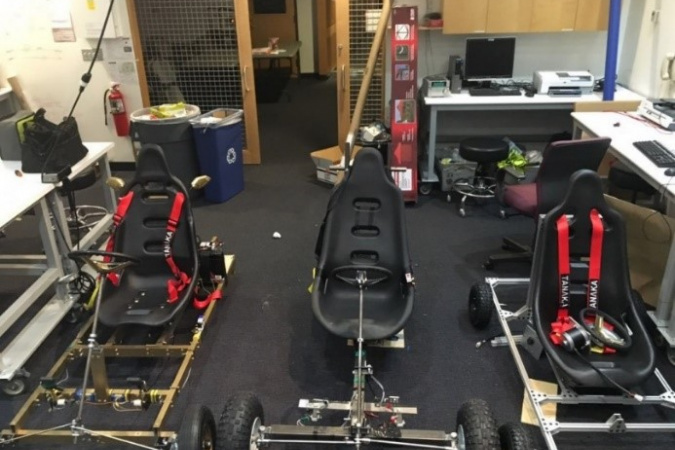
On July 2nd, we landed in Boston and started our engineering work at Harvard. We were provided a well-equipped senior design lab in School of Engineering and Applied Science, which is called the Cage, because it looked literally like a cage for engineers. Before hands on, we were trained for some practical skills first, like laser-cutting, drilling and welding on mechanical side, and PCB designing, soldering, wire crimping on electrical side, together with adequate safety training. Before coming to US, we were assigned into 2 teams and each team had 6 team members. We were required to design and manufacture 2 manned and drivable electric cars, and at the end of the program, we had a car racing in the Harvard yard. All of us successfully tried our electric cars and both of the cars were fully functional and we were able to collect data like speed, voltage, current etc, in real time. Together with the professors’ prototype, there were 3 cars in total parked inside the Cage, in colors of Gold, Space Grey and Silver respectively, which was the same as the full collection of iPhone6.
Beside the lab works, the social life in Harvard is also wonderful. After the daily work, we liked to play volleyball or football together to relax. And during weekends, we went to the beach, went kayaking or Go karting together. The Harvard students also took us to their friends’ house to join in some parties. We met and talked to people from different parts of the world, shared our cultural background and had fun. We really had a good time there!
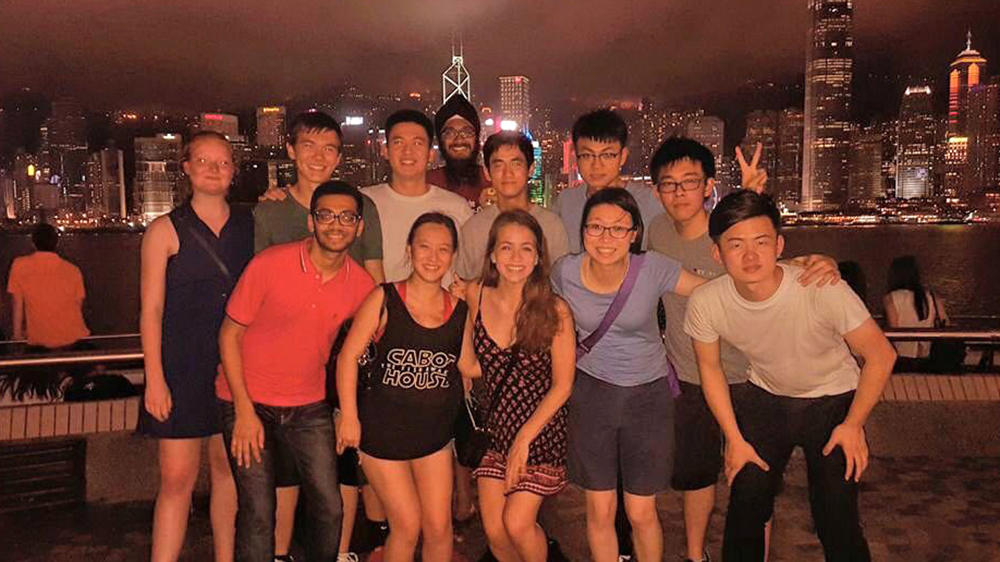
CHENG Ho-Yu Jacky (BEng in Mechanical Engineering)
Time flies. The 2-month program co-organized by HKUST and Harvard has come to an end. It was an extraordinary and unique experience for me as an engineering student in Hong Kong. To be honest, I didn’t expect the journey would be that fruitful and it definitely was a life-changing experience.
Right after the end of the spring semester, the program started in Hong Kong. 6 students from HKUST and 6 students from Harvard were split into two teams and given a challenge to design and build a functional Personal Electric Vehicle (PEV) by using 1500 USD. The first month in Hong Kong was mostly about organizing, brainstorming and planning of the projects while the second month in Boston focused on fabrication and fine tuning the design. The program guided us through the real world procedures and steps that an engineer has to think of during the design process. Moreover, workshops of multiple disciplines were provided to ensure that we were ready to create and justify our own design. It was comprehensive that I was able to work on electrical side (though not a lot!) as a mechanical engineer even though I did not have much knowledge about that.
There were loads of things I love about this program. I like the way our group of Harvard students managed their work and leisure time. They always kept a balance between working and relaxing. In Hong Kong, we, Hong Kong people, tend to work as much as we can in our daily life and thus often end up still working at 12 am. This is actually an unhealthy style in the long term as you will get bored and run out of patience for things that you are working on, which was probably something interesting to you in the first place. For Harvard students, they always plan to relax themselves after intensive work. For example, during the 2-month period, we generally spent our time on sports or ice-cream breaks after working for a whole day, which to me is a health cycle to stick with, and definitely something that HKUST students should learn about.
Another takeaway that is worth mentioning is about decision making for any engineering projects. Whenever we are designing, especially for brand new ideas, we generally won’t have adequate information to guarantee the validity of our decisions. This is because the components and raw materials you are going to order do not always come with engineering specifications that you want to know during the design phase. And there could have no reference for you to follow especially when you are testing a new design that no one has ever done. For big companies in the real market, they increase the reliability of their results through spending extra money on experimenting materials and components. However, we do not always have extra funding for experimental purposes. Therefore, a possible solution for this issue is to prepare a backup plan for your most desired design. A good and responsible engineer should always think one step beyond the current situation and be ready for unanticipated failure of the system. So that you could satisfy the requirements all the time, even if you are not using your best setup.
Apart from knowledge we learnt during the official working hours of the program, experience from traveling during leisure time were awesome as well. We explored the Harvard area and Boston city thoroughly and had a great time living there. Some of us went to New York and Washington DC during the weekend and have felt the differences amongst states in USA. Moreover, we tried games and activities that are not available in Hong Kong but common in USA, such as Boda Borg and Go karting. All these activities have made the trip wonderful and an unforgettable experience for all of us.
In short, this summer was one of the greatest ones I've ever had. I was originally struggling in choosing between this program and an internship opportunity in Hong Kong before confirming to join. Now I am 100% sure that I have made the right choice, and I do recommend students from HKUST to join this program, as it definitely will benefit you academically and spiritually.
FU Shuhao Howard (BSc in Computer Science and Mathematics)
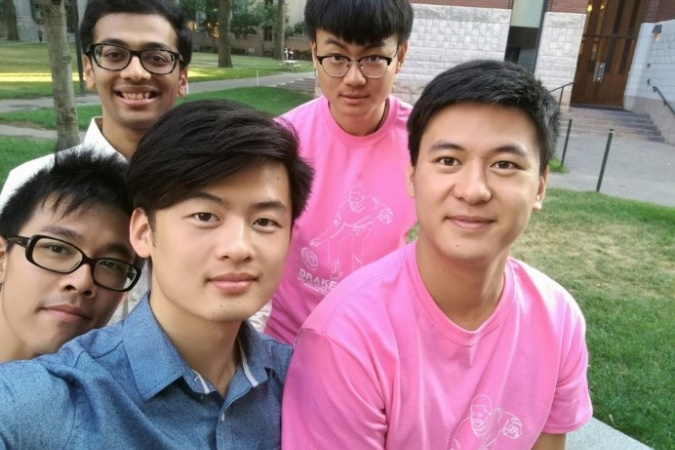
My motivation to apply for this project is to gain experience in group projects and to learn a lot of technical and professional skills. But now when I look back at the eight life-changing weeks, I find that what I gained is actually way much more than I expected.
Our project is to build Personal Electric Vehicles (PEVs) that are able to carry one person. We twelve people are separated equally into two teams to create a more competitive atmosphere and encourage our creativity. From initial ideas to our finalized project, we had hundreds of brainstorms and countless reviews and comparisons. This is the part I treasure the most no matter whether we won or not.
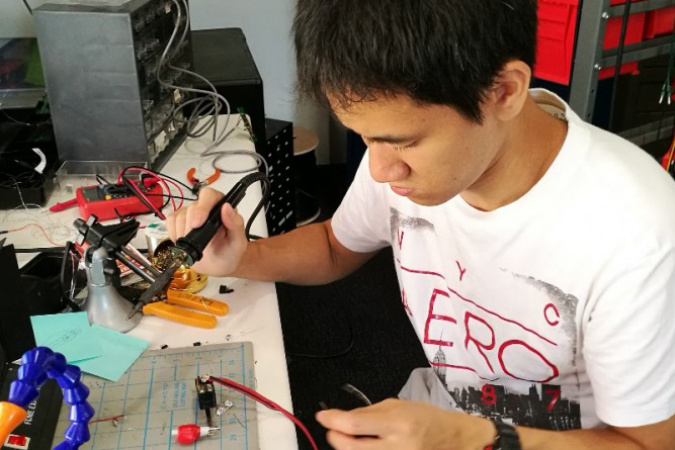
However, rather than talk about the design procedure we went through, the improvements we made, good teamwork quality we presented, I’d like to focus more on the values other than technical stuff.
In the amazing eight weeks, I learned a lot from all of them. I learned how to fully get involved in a project with responsibility and undertaking from some of us working for consecutive three days and three nights in order to refine the design and improve the vehicle. I learned how to work hard, play hard from all of us having parties, doing all kinds of sports, watching movies or Trump’s speech and counting how many times he said “build the wall”. I learned how to deal with conflicts and free-riding in a working group from all the effort we made to get a teammate back to work.
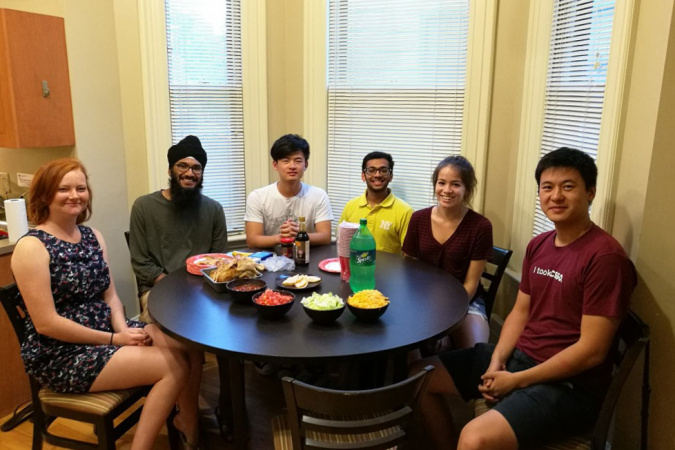
In Hong Kong, Harvard students experienced a totally different city compared to Boston. They were amazed by the huge golden fish in the Golden Fish Market. I could tell how exhausted they looked after waiting for one and a half hours to get into Genki Sushi and how excited they were after tasting the stunning sushi. In Boston, we got a taste of the most native American lifestyle. We watched an unforgettable baseball game with five impressive home runs, which also initiated me into baseball. We went to the beach in an American way, laid down in a towel for an entire afternoon and brought the sand all the way back. During the time we were together, though we had different cultures and values, we had one thing in common, that is having fun.
In short, it was the most awesome summer I spent with the most awesome people I have ever met. I will always be grateful for their help and for the fun we had.
Jainam Bharatkumar MEHTA (BEng in Electronic Engineering)
The Harvard-HKUST Summer Design Program was an experience that I will never forget. I began the program with the mindset that it would be an intensive, hands-on research program, but the two months turned out to be so much more than that.
Starting off in Hong Kong, we spent the first couple of weeks learning about the basics of not only electric vehicles, but the fundamentals of what makes a car. We spent a lot of time getting to know each other, socializing, seeing the sights of Hong Kong and more. We had a great couple of meals together with all the professors and participants and that really helped in forming tight-knit bonds between us all, right from early on in the program. We also made sure to explore some of Hong Kong’s natural beauty by going on Asia’s best rated hike, Dragon’s Back.
On the third week, I, along with the Harvard Students decided to take a short getaway to Chiang Mai in Thailand!! As several of the Harvard students were visiting Asia for the first time, we thought Thailand would be the perfect destination to visit. Chiang Mai was full of thrilling experiences, and we took full advantage of that by visiting elephant and tiger sanctuaries and even zip lining through a rainforest. Of course, the food is not to be forgotten which was just as savory and delicious as expected.
By the time we moved to Boston in the beginning of July, both teams were already well settled in their grooves and had almost completed the core design elements. At Harvard, we soon finalized our components lists and began placing our materials orders. Over the coming weeks, we were given almost complete freedom over our time, with very few lectures or contact hours. This allowed us to work really flexibly as team, but also put the responsibility of our work in our own hands.
Being able to work when we pleased meant we could even take some days off, or leave early! We decided to spend some of this time exploring the city of Boston, going kayaking in the Charles River, playing sport in the excellent facilities at Harvard and even visiting a couple of beaches.
Not only did we see the city and its sights, but I also had several chances to experience American and Bostonian culture. The 4th of July Independence Day holiday was truly an extraordinary experience, with everyone coming out to celebrate with their American flags. We had a great time by the Charles River, where we spent the evening watching the Independence Day fireworks. Another fun memory was the Red Sox baseball game, at Fenway Park. I really loved the atmosphere there and the crowd was absolutely great. The game turned out to be really interesting as well, and the Red Sox ended up winning 11-7 which was one of the highest scoring games recently. And of course, I also exposed myself to the American fast food culture, but fortunately, I didn’t gain too much weight!
On the whole, I learnt a lot about electric vehicles, and specifically, embedded systems and power electronics. But more importantly than that, I learnt a lot about teamwork, project management, the design cycle process and the fundamentals of building a product from scratch, which was definitely not as easy as it seemed. I had to work with parts and ideas that I hardly knew about, and this really taught the me importance of trust. As a team, we had to rely on each other to deliver their parts, whilst at the same time working together on systems integration. These were qualities I believe our team excelled at.
All in all, the Harvard-HKUST Summer Design Program was simply an extraordinary experience, one that I was privileged to have. It was a fun and fulfilling, all round experience where I was able to develop myself both personally and socially. I was able to live, learn and make friends with a great bunch of people whom I will never forget. I made amazing friendships and lifelong memories and these two months have created memories that I will surely cherish for years to come. From the fun trips and travels to the long nights in the lab, this program has given me much more than I had imagined.
NG Cheuk-Wai Dion (BEng in Mechanical Engineering)
The research topic of the Harvard-HKUST Research Program this year was about Personal Electric Vehicles (PEVs) and this was one of the reasons for me to apply for this program. I was interested in the transportation sector and I believed that I could learn more about different systems of vehicles as well as consolidate my knowledge from the hands-on work. I felt very fortunate at the time when I was notified to be selected as one of the six students for this program. It provided me a great opportunity to work with other smart students from different disciplines and meanwhile have a taste of cultural exposure on foreign countries. I not only got an unforgettable experience in this summer but my life has also been changed because of this program.
Before going to Harvard, we spent a month in Hong Kong mainly for brainstorming and ideations in order to create the prototype of our kart. It was indeed not an easy process from the beginning to the final decisions of design and materials’ selections. We did lots of intense discussions and encountered many problems during the process but I definitely learned a lot from it and also from each other. We then arrived in United States after spending one month in Hong Kong and we thought that everything should be good and ready to be assembled. However, our team found that the material we selected for the chassis was too heavy which was out of our expectations and would affect the driving performance. We then decided to make good use of them for building the first version of our vehicle as a reference for redesigning and making further improvements for our version two. Everyone must come across failure in their life and no one can achieve success easily without any failure. Failure is worthwhile to pay as it provides us opportunities to realize our problems and make enhancements. The key is to learn something from it; otherwise it is a failure only. Another thing that impressed me in this program was the integrated engineering. Engineers cannot work alone in real-life situations as it requires multidisciplinary knowledge for the projects. Our team worked well and a great sense of satisfaction was gained after our kart could be successfully driven at last though we encountered a lot of difficulties and even worked overnight for few days. After this program, I am now keen to learn more about electrical and computer engineering so as to enrich my knowledge and equip myself better.
Culture exploration is another highlight of this summer program and we had much fun and great time in both Hong Kong and United States. We went hiking in Dragon’s Back, watched firework for the Independence Day, watched the Boston Red Sox baseball competition, and enjoyed different kinds of cuisines and so on. We even travelled to New York and Washington for four days and visited most of the renowned places like Statue of Liberty, Times Square, White House, Lincoln Memorial, etc. The journey was very fun though the schedule was tight.
Life only comes around once and I have no regret in making the decision for applying to this program. This summer was the best summer I have ever had so far: upgrading myself, exchange of knowledge and culture and making new friends. At last, I would like to take this opportunity to thank all the professors and staff for their advice, guidance and great support!
WONG Cheuk-Fung Raphael (BEng in Electronic Engineering)
The Harvard-HKUST Summer research program is a program that gives friendship and fun with very intelligent individuals. Despite the cultural differences between HKUST and Harvard students, we strived for our best and had a lot of fun together as friends and team-mates. By spending lots of efforts and time, we managed to finish our Personal Electrical Vehicle (PEV) and achieved tremendous results, in which every one of us were proud of. With all these experiences, this program truly benefits me both academically and socially. I am truly thankful for everything that happened within these two months.
Based on different cultural backgrounds, cultural differences became significant when we first started to work as a team, especially on how we and the Harvard students approach and solve a problem. I personally as a Hong Kong student was trained and guided to search the internet for solutions of a problem and continue solving it until we are clear of the outcome. However, my team-mates approached it differently. They would discuss with professors or professionals and solve the problem through trial and error. This method seems to be outrageous at first, but later we understood that sometimes the best solution lies in the unknown area waiting to be discovered. Through discussing our problem with a person with more experience, their ideas actually aided us to take more parameters into account and that eventually gives better result for formulating our design.
It really amazed me on how the Harvard students could differentiate work and leisure time so clearly. Despite the fact that we put 200% effort into our project, they never forgot the importance of taking a break. Thanks to that, we had a lot of fun together. I still remember playing the game “Tagpro” in every lunch time we had, which is an online game that requires the gamer to compete and capture the flag as a team. It was a simple game with very low graphics, but still we all put ourselves into it and had tons of fun together. Other than that, we also held parties and explored around both Hong Kong and Boston. As a Hong Kong student, they truly sparked up my summer with laughter and excitement.
Joining this program was an extraordinary experience that gives opportunity to self-explore new knowledge and implement them with the right tool. Unlike any courses we took, we were required to come up with our own design and parameters for testing. It was fun, and at the same time challenging. With the given freedom, there can be a lot of failures with our design. Nevertheless, with the support and guidance from professors and experienced individuals, we managed to obtain valuable opinions and made changes immediately. One more thing I learned is to be cautious all the time. As the deadline became nearer, we began to rush and implement any possible solutions we could think of without considering the ease of usage and debugging. That eventually induced even more system failures and it took out a lot of sleep in order to solve those problems, yet our team stayed as a whole and cheered everyone up when needed. With that unfallen team spirit, we managed to pull off a great PEV and compete equally with the other team. Even now, I am still very proud of what we managed to achieve.
All of these cannot be possible without the help from others. I would like to give my most sincere gratitude to all the professors and inspiring individuals that made this happened. Without their advice and organizing everything, from giving technical advices to purchasing our flight tickets, I would never have the chance to meet my wonderful team-mates nor building our design from simple drawings all the way to a physical prototype. Once again, I am truly thankful for having been in this program and I will treasure all the memories we created in the last two months.

